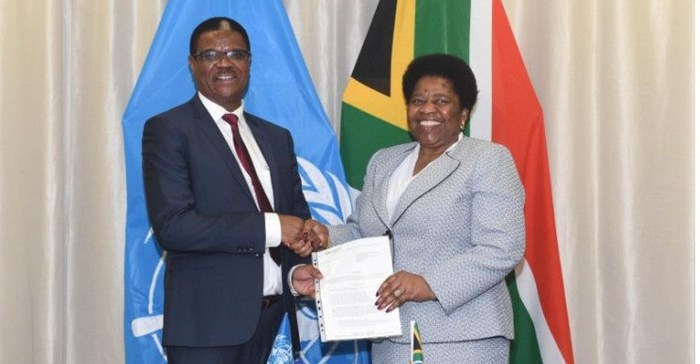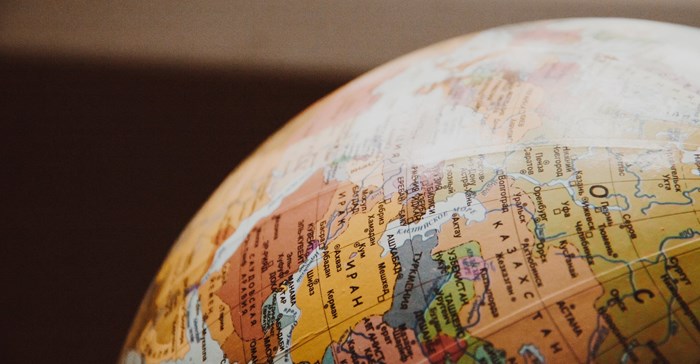The Council of the European Union is pushing for a global deal aimed at pandemic prevention, preparedness and response.
This was the sentiment driving the negotiations on new rules for dealing with future pandemics, which have begun in earnest at the World Health Organization (WHO).
The first meeting of an Inter-governmental Negotiating Body (INB) took place behind closed doors on 24 February 2022 to agree on ways of working and timelines. The UN health agency's 194 member countries were in theory represented, but with Russia invading Ukraine It is unclear whether Russia was represented at the meeting.
The new pact is among more than 200 recommendations made by various reviewers for shoring up the world's defences against new pathogens following the Covid-19 pandemic that has killed more than 6.2 million people in two years. It will be backed by a Washington-led effort to build a global pandemic-prevention fund hosted by the World Bank.
Among the suggested proposals for the pact, is the sharing of data and genome sequences of emerging viruses and rules on equitable vaccine distribution.
Dawning of a new era
"This is the start of an historic opportunity for Member States to work together to strengthen the world’s structures and systems for pandemic preparedness and response," WHO director-general Tedros Adhanom Ghebreyesus said in the meeting's Opening Remarks which were published on the World Health Organization's website on 2 March 2022.
"The pandemic has exposed and exacerbated fundamental weaknesses in pandemic preparedness and response at both the national and the global levels: complex and fragmented governance and lack of leadership; inadequate financing; and insufficient systems and tools. Instead of solidarity, the pandemic has been marred by inequity," Ghebreyesus said.
"Equity does not mean providing access to tools when there is a surplus, when the privileged have used what they need. It is about timely access, so that all people have access to all the available tools, at the same time."
Reading the fineprint
The EU paints the pandemic treaty as lifesaving and necessary. It says an international convention, agreement or other international instrument on pandemics would further support and focus on early detection and prevention of pandemics; provide resilience to future pandemics; would ensure universal and equitable access to medical solutions, such as vaccines, medicines and diagnostics and a "One Health" approach which would connect the health of humans, animals and our planet.
"More specifically, such an instrument can enhance international co-operation in a number of priority areas, such as surveillance, alerts and response, but also in general trust in the international health system," the Council said.
However, there are many unanswered questions around the fineprint of the Pandemic Treaty. A precursor to the INB meeting have been the WGPR meetings that have been taking place behind closed doors.
On 18 February 2022, The Working Group on strengthening WHO Preparedness and Response (WGPR) to health emergencies held its seventh meeting and published a document Survey on implementation of Covid-19 recommendations: preliminary findings.
The document speaks to the following recommendations: surveillance systems that would link into each country's national health system; the implementation of universal digital vaccination certificates and guidelines on how each member country would be paying fees to the World Health Organization, in addition to the annual membership fees each member country is already paying.
Pertaining to the finance model, the document proposes that "States Parties should ensure adequate and sustained financing for IHR implementation at the national and sub-national levels and provide adequate and sustained financing to the WHO Secretariat for its work on preventing, detecting and responding to disease outbreaks."
Furthermore, the document speaks to creating an International Pandemic Financing Facility to raise additional reliable financing for pandemic preparedness and for rapid global finance-surge for response in the event of a pandemic.
"The facility should have the capacity to mobilise long-term (10- to 15-year) contributions of approximately $5 to $10bn per annum to finance ongoing preparedness functions. It will have the ability to disburse up to $50 to $100bn at short notice by front-loading future commitments in the event of a pandemic declaration," it said.
The lack of civilian access to meetings is the cherry on the dictatorial top. According to a recent finding "WGPR has not granted non-state actors the opportunity to speak at its regular meetings, and, after an initial period of entirely closed sessions, only non-governmental organisations in official relations with WHO have been permitted to even observe discussions. International human-rights law and best practices in global-health governance require the full and meaningful participation of a wide range of civil society and community organisations, and in particular marginalised individuals and groups."
The Health and Human Rights Journal puts it so aptly: "The potential drafting of a pandemic treaty could [...] pose a clear risk that “human rights obligations will be lost, diluted or misconstrued in efforts to reshape global health law.
"There remain concerns that a hastily established treaty drafting process may not adequately engage with civil society and community organisations, allowing states to slip back into the habit of “all-too-easily sidelining the international human rights framework".”
"To ensure the rights-based development of a prospective treaty, consultative processes guided by the right to participation are both necessary and required under international law; however, the ability of civil society to participate in the process of treaty deliberations and stakeholder consultations has thus far been severely limited."
The foundation of a One-World Government?
Of concern, is the degree to which the World Health Organization will no longer be making recommendations to member countries but dictating to them. This is a point particularly canvased by Astrid Stuckelberger, a scientist at the Institute of Global Health of the Faculty of Medicine of the University of Geneva. She was recently awarded the title of Honorary Professor of the Institute of Bioregulation and Gerontology of the Russian Academy of Medical Science.
She is a former employee of WHO who has subsequently become a whistleblower. Her most recent statements released in March 2021 speak to the fact that the 194 member countries are not voting on whether they agree on the Pandemic Treaty; instead they are legally bound to concede to its framework. "This delegation [put together to draft the Pandemic Treaty] has been embedded in the Constitution of WHO, and is immediately approved by 194 member states, regardless of whether they adopt its principles. This delegation is legally binding according to the International Health Regulations," she says.
Gail Daus-van Wyk 8 Mar 2022 Furthermore, Stuckelberger warns that if the new Pandemic Treaty is adopted by member states, "this means that the WHO's Constitution (as per Article 9) will take precedence over each country's constitution during natural disasters or pandemics. In other words, the WHO will be dictating to other countries, no longer making recommendations," she says.
To this end she challenges society to ask themselves whether we should endow any single person or conglomerate of persons with such incredible amount of power without having them account to any kind of democratic responsibility and legitimacy, to any checks and balances to keep corruption in check.
If the WHO is being led poorly there'll be nothing on the same scale to counter it.
How will South Africa be impacted?
While the Pandemic Treaty impacts 194 countries, the biggest question now is how South Africa will be impacted by the Pandemic Treaty? South Africa is already paying $1,3m annually to the WHO (50% invoiced in US dollars and 50% in Swiss Francs). Can South Africa afford to pay more towards the WHO's financial model to ensure it is protected from the impact of future pandemics? Are we not already so heavily endebted to The World Bank which last month approved a loan of $750m to South Africa? The loan is linked to Covid-19, aiming to help protect the poor and support economic recovery from the pandemic.
Also of huge concern is how the Pandemic Treaty will dictate the roll-out of the National Health Insurance in 2026 or whether it will be replaced by an entirely different universal healthcare framework. The WGPR in its preliminary findings says: "States Parties should strive to integrate the core capacities for emergency preparedness, surveillance and response within the broader health system and essential public-health functions.
This, in essence, means the surveillance framework being referred to here by "the broader health system" will need to be in place before South Africa's National Health Insurance can be rolled out.

Source: Supplied. Dr Owen Kaluwa, the World Health Organization Representative in South Africa presenting his credentials to the Deputy Minister of International Relations and Cooperation, Ms Candith Mashego-Dlamini in February 2020.
Already a surveillance framework is available in the Western Cape's hospitals. At the State of the Province 2022 address, Western Cape Premier Alan Winde said he would be tapping into the Health Department's tools and resources that have enabled it to provide a world-class response to the pandemic. This will be for the purposes of his Violence Prevention Unit he will be launching under the Health Department. He said he would be tapping into the infrastructure of contact tracing, the digital tools to map out geographic crime hot spots. Plus he would have access to a centralised digital database.
It's not clear whether this will be the surveillance framework the WHO will tap into particularly in the Western Cape.
Furthermore when laws get gazetted by National Government without impact assessment or citizen input, then it's imperative alarm bells should be ringing. Particularly when these are laws that speak of allowing for the forced isolation of symptomatic patients who refuse treatment and admission at a health facility, including a provision that they can be held for 48 hours at such a facility before a warrant is obtained to extend their isolation period.
Recent findings are that "Despite several engagements, the Department of Health (DoH) has failed to provide clarity or explanations on several key issues within the [National Health Insurance] 'Bill', which are of major concern to all stakeholders."
What's next?
Dr Owen Kaluwa, the new WHO representative to South Africa, has remained under the radar for the last two years.
There is record of Dr Kaluwa meeting the Minister of Health, Dr Zweli Mkhize in January 2020, to discuss the country’s health priorities and the work of WHO in South Africa for the current biennium, 2020-2021. In this public statement it said "Dr Kaluwa assured Dr Mkhize then that under his leadership there will be re-invigorated collaboration between WHO and the National Department of Health (NDoH) to further accelerate progress in implementing the NHI-related health-systems reforms aimed at UHC [Universal Health Coverage], strengthening preparedness to public-health emergencies..."
Lee Callakoppen,
Bonitas 28 Feb 2022 Ultimately, how South Africa will be impacted by the Pandemic Treaty will be determined by the quality of WHO's leadership. The elephant in the room is how it will respond to Russia's involvement as a member country. According to international law is Russia not legally bound to participate in the drafting of the Pandemic Treaty? Can the WHO sanction Russia? Furthermore, can it actually afford to sanction Russia when it contributes $12m a year to the World Health Organization and is tenth on a list of the Top 10 Countries Funding the World Health Organization. (The US sits at Number 1 contributing $116m a year, and China at Number 2 contributing $57m a year.)
** The intergovernmental negotiating body (INB), tasked with drafting and negotiating this Pandemic Treaty will hold its next meeting by 1 August 2022, to discuss progress on a working draft. It will then deliver a progress report to the 76th World Health Assembly in 2023, with the aim to adopt the instrument by 2024.
The 2024 decision will also clear the way for negotiating complementary amendments to the International Health Regulations, WHO's binding rules adopted in 2005.
These set out countries' obligations where public health events have the potential to cross borders. These include advising the WHO immediately of a health emergency and measures on trade and travel. Adopted after the 2002/3 SARS outbreak, these regulations are still seen as functional for regional epidemics like Ebola but inadequate for a global pandemic.
*** WHO's Ghebreyesus is likely to be elected unopposed for a second term in May.




































